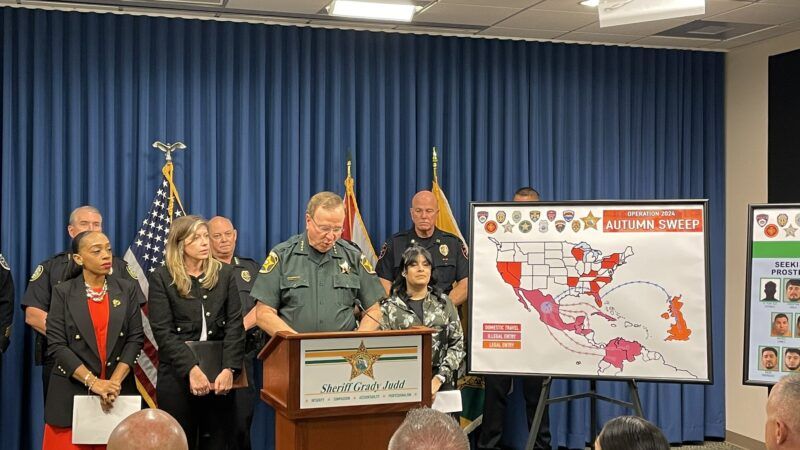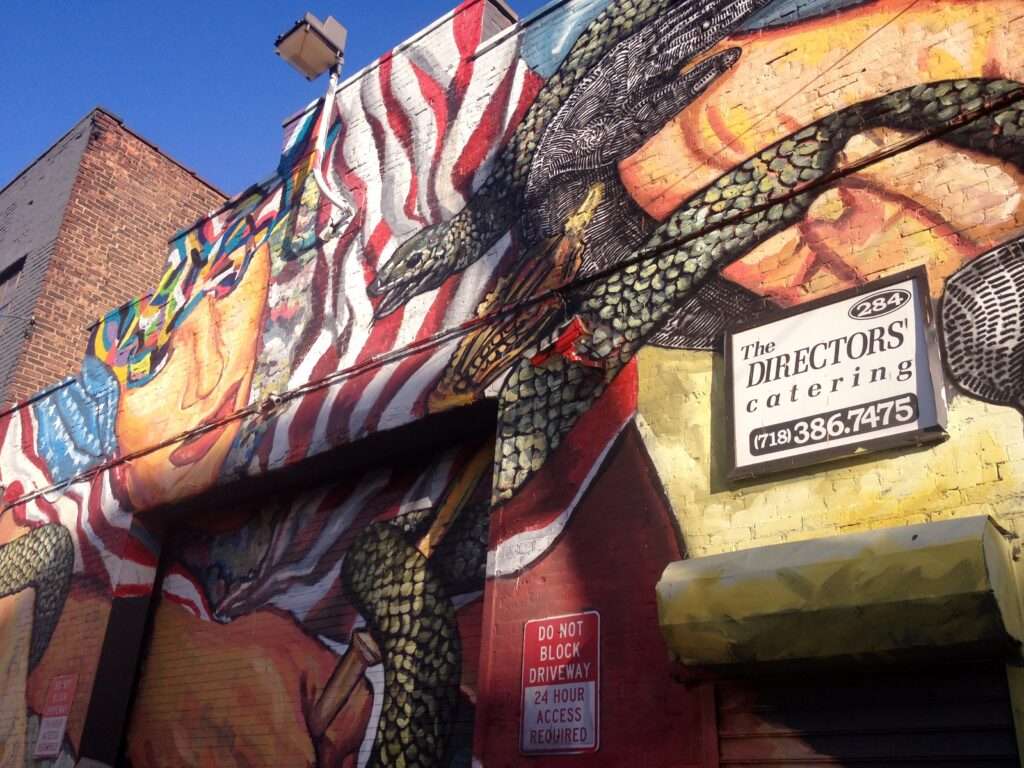47 Sex Workers and 96 Clients Arrested in Florida 'Human Trafficking' Sting
Polk County, Florida, continues to be one of the worst offenders for sham efforts to combat human trafficking.

The Polk County Sheriff's Office (PCSO) is publicizing "Operation Autumn Sweep" as a "human trafficking operation" that netted 157 arrests, including 25 arrests of illegal immigrants. But the vast majority of those arrested are accused not of anything the average American would view as trafficking. Instead, they were allegedly either soliciting prostitution or offering to commit prostitution.
After posing online as either (adult) sex workers or prospective customers, cops arrested 47 people for allegedly offering to commit prostitution and 96 people for allegedly soliciting sex.
You are reading Sex & Tech, from Elizabeth Nolan Brown. Get more of Elizabeth's sex, tech, bodily autonomy, law, and online culture coverage.
Operation Autumn Sweep also yielded three arrests of men traveling to meet an undercover officer posing as a 14-year-old, and 10 people arrested on suspicion of unspecified other crimes.
Only one person was arrested on suspicion of human trafficking.
Sowing Division and Fear
This sort of bait and switch is incredibly commonplace in the U.S. these days. Regular Reason readers will recognize that this has been going on for a long time—so long and so often that one might argue it's hardly newsworthy anymore. But I think it's still worthwhile to call out such shenanigans periodically, both as a reminder that this is still going on and as a heads-up for people new to this issue.
And Polk County, Florida, is one of the worst offenders when it comes to sham efforts to combat human trafficking. Sheriff Grady Judd routinely engages in this sort of stunt, which seems so clearly designed to drum up fear.
"We arrested 25 illegal immigrants during #operationautumnsweep," Grady wrote on X. "The federal government allowed them to walk across the border unobstructed. They ended up in Polk County, and decided to commit crime. They're now in the Polk Pokey…"
When people hear that more than 150 people—including a bunch of undocumented immigrants—have been arrested in a human trafficking sting, they seldom stop to look at the details. They simply squirrel it away in the part of their brains that's been hearing for years how sex trafficking is rampant and illegal immigrants are coming here to commit crimes.
Violating Privacy and Bodily Autonomy
What we've really got here, for the most part, is a bunch of adult men and women trying to engage in private and consensual sexual activity—and the state saying, no, you should go to jail for that.
It's a gross infringement on privacy and bodily autonomy masquerading as a blow against the baddest of bad guys.
Police officers—including Grady—needn't make misdemeanor prostitution arrests to go after people actually engaging in coercion and violence. They don't need to saddle a whole lot of people with criminal records and public embarrassment just for trying to engage in some intimacy or make some money.
But a days-long sting operation that yielded one trafficking arrest that announcing 157 arrests does, nor is it as useful as political rhetoric. So again and again, we see sex workers and their would-be customers as collateral damage in authorities' attempts to appear tough on crime, demonize immigrants, and justify their vice-squad budgets and federal human-trafficking grants.
A Sweep Too Sweeping
The one person arrested on suspicion of human trafficking was a 25-year-old man named Travis Hutchinson. According to an affidavit for probable cause, Hutchinson arranged prostitution dates for an adult woman and collected money from her afterward while using coercive tactics (like keeping her immigration documents), threats, and violence to ensure her cooperation.
This is bad! Obviously. And if the allegations are true, Hutchinson definitely deserves to be prosecuted.
But Hutchinson's arrest isn't justification for an operation as sweeping in scope as Polk County's Operation Autumn Sweep.
This isn't simply because an arrest doesn't necessarily mean the allegations are true. (In this case, the reported victim was facing prostitution charges that would hopefully be waived if her actions were done under duress.) Even if everything authorities are saying about Hutchinson is true, it doesn't follow that cops need to threaten victims with charges in order to help them; there are other ways that law enforcement or social services could do outreach to victims.
And even if we assume that police really do need to lure women to them by pretending to be prostitution customers, it does not follow that those who aren't victims need to be arrested, nor that police need to entrap and arrest nearly 100 totally unrelated men.
More Sex & Tech News
• "Tennessee doctors who provide abortions during a medical emergency to protect the life of the mother will not be punished," Nashville Scene reports. The ruling—from a panel of Davidson County Chancery Court judges—protects doctors who perform such abortions from "disciplinary actions from the Tennessee Attorney General's office and the Tennessee Board of Medical Examiners. However, the chancery court does not have the jurisdiction to block the criminal statute under which physicians could face a felony charge and prison sentence as high as 15 years."
• A federal appeals court has revived the state of Indiana's ridiculous lawsuit against TikTok. "In this particular claim," writes First Amendment lawyer Eric Goldman. "the Indiana [attorney general] alleges that TikTok coaxed users to install its app on false pretenses, including deceptive omissions about its ties to China."
• A new group called the Erotic Professionals & Allies United (EPA United) is "teaming up with Rock the Vote to mobilize sex workers." The group's co-director, Savannah Sly, tells Reason that it "is nonpartisan. We are not endorsing candidates. Depending on how the election goes, EPA United may take actions directed at educating lawmakers in the future, but that has yet to be decided."
• "Three states are renewing a legal push to restrict access to the abortion medication mifepristone, including reinstating requirements it be dispensed in person instead of by mail," reports the Associated Press. Requests filed by Kansas, Idaho, and Missouri "would bar the drug's use after seven weeks of pregnancy instead of 10 and require three in-person doctor office visits instead of none in the latest attempt to make it harder to get a drug that's used in most abortions nationally."
• French courts block foreign porn: "The Paris Court of Appeal today ordered the complete blocking of several pornographic websites, including Xhamster and Tukif, over their failure to roll out solid age verification systems," notes Politico.
• Italy, which already bans surrogacy within a couple, is now saying it's illegal for people to leave the country to employ a surrogate.
• The Lancet Commission on self-harm hasn't accepted the idea that banning social media use among young people would be good for their mental health. "Social media can be a source of support for those who self-harm and a way that people can seek help; recent meta-analyses of the association between social media and mental health report only weak effects," it argues in a report published online on October 9. More:
The uptake of social media, combined with excessive parental restrictions on children's freedom (helicopter parenting), is considered by some, including [social psychologist Jonathan] Haidt, to be the cause of the increase in self-harm among young people—possibly reflecting a new way of growing up….Currently, the evidence for Haidt's proposition is uncertain. There is evidence that rates of anxiety, depression, and self-harm might have increased in successive generations of young people, although this claim is disputed by some and might not have happened globally. However, whether smartphone and social media are the culprits is not clear. Longitudinal data reveal associations between levels of social media use and depression, but these associations are weak, and do not imply causality.
Today's Image



Show Comments (52)